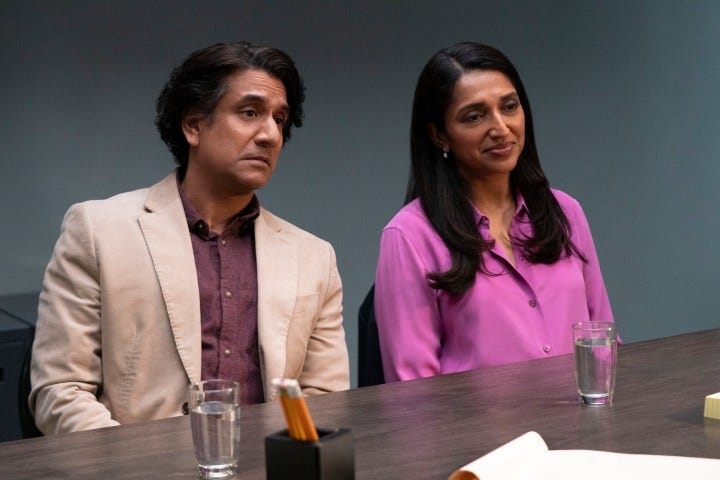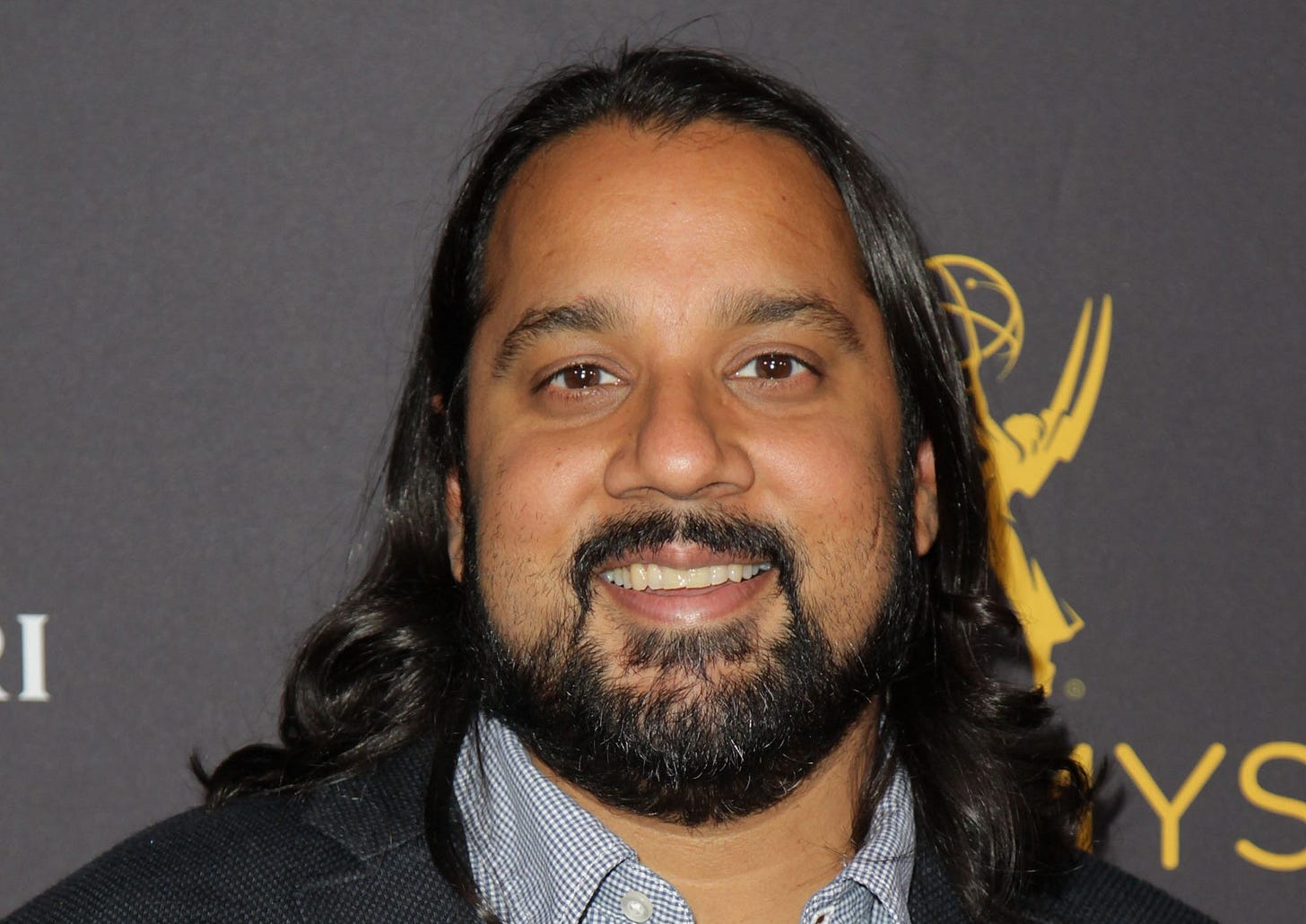Renegades | Vijal Patel on Learning Something from Everyone
Read more on how Vijal Patel's passion for storytelling inspired his transition from Engineer to Creator and Showrunner of "The Pradeeps of Pittsburgh"
Welcome to Renegades, Gold House’s newsletter series spotlighting Asian Pacific leaders and creatives who are carving their own paths and defying stereotypes along the way. This week features Vijal Patel, creator and showrunner of “The Pradeeps of Pittsburgh” on Amazon Prime Video, following an Indian family and the tumultuous yet humorous events of the two years since they arrived in Pittsburgh. Vijal talks to us about changing careers from engineering to writing, learning from Kenya Barris on the set of “black-ish,” and celebrating the unique details that each of the writers brought to “The Pradeeps of Pittsburgh.” Watch “The Pradeeps of Pittsburgh” on Amazon Prime Video now!
What did you want to be when you were growing up, and how does that compare to where you are now?
I wanted to be an engineer, or- Well, as one of my uncles said, “you either want to be a rocket scientist, like an engineer for NASA, or a truck driver.” It was very binary and that said a lot about who I was as a person. I have this vast interest in almost everything. So I think that's what led me to become a writer, because I really love characters, and I really love exploring anything.
Like I will sit down next to someone and say “where do you work” and he’ll say “I work at a toothpick factory”. I'm like, tell me everything about toothpick manufacturing, please. I want to know everything about it. That’s what gave way to what I became, I was just a storyteller because there are stories everywhere. And with this show, I'm telling something inspired by my personal story that obviously is going to resonate with so many people’s stories.
How did you end up making that leap from engineering to writing? How did you get that first gig and what was that process like?
I went to school for finance and engineering, and I was ready to just work in that field. Then a friend of mine, a very dear friend of mine who knows me as a person, he pitched to me that I should become a comedy writer because he goes, all you ever do is tell stories. That's all you ever do. Even when you aren't supposed to be telling a story. You tell a story. And I'm like, oh, I do do that.
I really love television. I love the form. I grew up with it. When that was offered to me as a prospect of a career even though I had already fully committed to another career, I had to jump at that opportunity. I was early enough in my life that I could take that risk. I did the risk analysis. I'm was like, well, I don't have much to lose, but I have everything to gain. Let me try it now.
Some people have a meteoric rise, I had a mediocre rise, right? But what it speaks to is just hard work. I do stand up sometimes and I have this joke where I say, “my parents, they taught me there's no such thing as luck. It's all about hard work. Even when I was a kid, if I asked for Lucky Charms, they'd say they're not Lucky Charms. They’re Hard Working Charms.” It's so true. And I always internalized that lesson.
So when I got to Hollywood, I just took any job I could. Production assistant, writer's assistant. I learned what a call sheet was. To those who don't know, it's basically the sheet of what we're going to shoot today, who's acting in it, what time we're going to do it. I didn’t even know what that was. So I learned, like I said, I love learning everything. I asked every question and that's how it happened. And I do have a natural skill for telling stories, I just brought that to the table myself. And that's how it worked. Then I just built and built and built. And now here we are today.
Were there any mentors or figures that really helped you in that transition?
I would say every writer I’ve encountered was a mentor of some form or other, and every writing room I ever worked in I learned so much from the showrunners. I worked on this show called ‘Til Death, it was my first network show. Josh Goldsmith and Cathy Yuspa were the showrunners, I learned everything I could from them. About how to stay true to your vision, how to be confident. Because you're going to get notes and you're going to be like, “is this right or is this wrong?” None of it's right. That's the thing about show business. In engineering, some of it's right. Like, there's a wrong way to build a bridge. There's definitely a wrong way to do that. In show business, there's no real wrong way to do something. So you have to rely on your instincts, you have to have faith in your humor or your vision.
Then I worked on black-ish, Kenya Barris created that show. That was very autobiographical from his experience, even though it was a fictional version of his experience. I learned how to, again, rely on the little ground that you stand on and how you see the world. Now translate that into characters that aren't you. Learning that is what helped me make The Pradeeps of Pittsburgh. They're not the Patels, they're the Pradeeps and they are a different family. But they have a lot of my point of view or a lot of my family's point of view or experience in it.
Was there any sort of galvanizing moment or memory from your own family or experience that inspired you to pursue writing a show like this? Or was it more of an amalgam of stories that you wanted to tell?
I think it was an amalgam. One of the defining ideas of the show is that, yes, it's a family that has come to America, but everybody in the family does not have the same view on this experience. I've seen it before but I wanted to put it front and center. That's why we use this interrogation device in the show, because they're all telling their points of view on what they were emotionally like coming to America. The same thing happened to five people. They each see it differently so mining that for comedy, but also mining that for emotional truth, was a really fun thing to do. That inciting incident of coming to America as a family was always in me as like, “oh, this is an interesting story”, but it wasn’t until I became a storyteller professionally that I realized, “oh, I can now just create a show about this.”
You touched on black-ish and some learnings that you took from working on that show. Were there any insights you gleaned from working on that set that you brought to Pradeeps?
One is there's an authenticity that I bring or other South Asians who wrote on the show [bring]. I had a wonderful staff for season one that was just so good. More than half the staff was South Asian. I learned that from black-ish, there were a lot of Black writers on that staff and each of them had a different story about the Black experience in America that I hadn't heard the nuances of before. And I’m like, this is so interesting because this is what makes the show feel, again, not monolithic but very unique. It's all these experiences within the family. So I took a lot of that and put it in Pradeeps. I learned that those micro differences are all the difference. It makes it funnier. It makes it more real. It gives you more conflict, right? To have conflict amongst characters who have the same experience is a hard thing to do. Sometimes it's like, “well, they're all immigrants coming to America and they're all Indian. Where's the conflict?” I'm like, oh, you can find conflict, right?
Another thing I took is if I find it funny or I find it painful or I find it true, it's because it happened to me or it happened to somebody I know. That isn't always easily understood by somebody who may be reading it at an early stage of the process. So they don't see the full vision. Something that Kenya Barris is very good at is he sees it so clearly and helps others around him see it so clearly, that if people don't see that clearly yet, they will eventually because he knows what he’s getting too so have faith.
All the rooms I've ever been in, every writer has something really valuable and specific to add. No matter if they have anything to do with the story or the experience, those individual experiences that that writer has had will resonate. Once we find that, once something resonates, I try to find what feels universal. Then let's find the Indian version of that, or let's keep this and let's find out why you're feeling that way, or why I feel that way. And we could find a story or a character moment or something, or even a joke out of it. So that's what we want to do, create a universal show with very specific experiences.
What are you most excited for South Asian audiences specifically to see in your show?
A reflection of their experience. It is so relatable. It is so universal. The comedy, the pathos, the heartbreak, the laughing through your tears. If they lean into the show, they will see themselves reflected off of it.
If you know South Asians, even if you're not South Asian yourself, you will see, “oh yes, my friend is like that.” I want them to laugh at all the little details that we put in about being Gujarati or being Indian, or loving panipuri, things that you just don't see. But that thing of that love of panipuri is really a home sickness, you know? So I get it. And that's that's what I want. I'm very proud of the authentic vibe and I'm proud of how funny it is. This is a very funny show. It’s not just about immigrants it's about really funny people and a really funny family. So I'm very proud of that.
Lightning Round
Morning routine: wake up, smell my shirt to make sure I could still wear it. Then I go about my day.
Favorite book? Hitchhiker's Guide to the Galaxy
Rising Asian Pacific talent to watch: Ashwin Sakthivel, who plays Vinod in The Pradeeps of Pittsburgh. Like oh ok, is he the next Harry Potter?
Your hidden talent: I'm a very good cook. Chef cook, chef, chef cook.
Favorite snack: Chana Chor, which are spicy Indian fried, black lentils that are smashed and covered in the most delicious spices that, like, smell awful.
Comfort movie: The Godfather or Heat. Weird I know, but I find Heat comforting. It's shot around Los Angeles and I live in Los Angeles. There's something very like, “oh, yeah, where that shoot out was in the movie, I just took my kid to see the Kings game there!”







